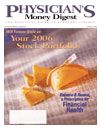Check out the Benefits of a Health Savings Account
Demand for health savings accounts (HSAs)will likely increase in the future, since thisalternative to traditional insurance allowsAmericans to stash away extra money for futuremedical expenses on a tax-free basis. Decisions onspending funds are made by you without relying ona third party or a health insurer, since account holdersown and control their HSA as well as makeinvestment decisions.
HSAs are replacing medical savings accounts(MSAs), which were launched a couple of yearsago but flopped. Unlike MSAs, which requiredfunds in the account to be withdrawn at a certaintime, HSAs can accumulate for a lifetime and canbe passed on to a spouse tax-free at death. If youare unmarried, the account will no longer be treatedas an HSA, but will pass to your beneficiary andbecome subject to estate taxes.
There was also a limit on how many MSAs couldbe set up for one person. With HSAs, individuals canhold unlimited accounts. In addition, participants canfund the full amount of their deductible with HSAs,whereas MSAs only allowed funding up to 75%.Both the employee and employer can fund HSAs.
The maximum pretax contribution to an HSA is$2600 for singles and $5150 for families. What'sgreat about HSAs is the triple tax savings: contributionsare tax-deductible, interest grows tax-deferred,and withdrawals for qualified medical expenses aretax-free. However, withdrawals for nonmedicalexpenses are subject to income tax and a 10% penalty.For account holders who are over age 65, withdrawalsfor nonmedical expenses will be taxed, butretirees will not be charged the 10% penalty.
Other advantages of an HSA include its portability.Your account does not change, even if you changejobs or marital status, become unemployed, or moveto another state. What's more, HSAs are flexible,allowing you to use the funds for health insurance ormedical coverage if you become unemployed, long-termcare expenses and insurance, and out-of-pocketexpenses not covered by Medicare. Any adult cancontribute to an HSA as long as they meet the followingrequirements:
- Under age 65
- Have coverage under an HSA-qualified high-deductiblehealth plan ($1000 deductible for singlesand $2000 for families)
- Have another form of low-deductible medicalcoverage, excluding dental, vision, long-term care,and disability insurance
- Are not enrolled in Medicare
- Cannot be claimed as a dependent by anyone else
To find an HSA insurer and account provider thatmeets your needs or the needs of a loved one, visitwww.hsafinder.com and www.hsainsider.com.
Lance Wallach, CLU, ChFC, CIMC, of Plainview, NY, speaks at more
than 70 national conventions annually and writes for more than
50 national publications. He speaks and writes extensively about
VEBAs, pension plans, and tax reduction strategies. He welcomes
questions or comments at 516-938-5007, or for more information,
visit www.vebaplan.com. The information provided herein is not intended as
legal, accounting, financial, or any type of advice for any specific individual or
other entity. You should contact an appropriate professional for any such advice.
